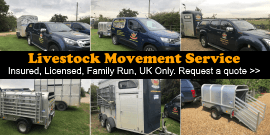Cattle Breeds
If you decide that, in principle, keeping cattle, either for beef or as a house cow, is something you’d like to consider, then you’ll want to do is look at the various breeds available and decide which one(s) you want to own. There are many different breeds of cattle available and the most suitable ones will depend on the enterprise and on your own preference.
If you visit some agricultural shows with the aim of having a look at some cattle breeds, you will find large numbers of the Continental breeds (even if they have the suffix “British”) – for example the Charolais, Simmental, Limousin and Belgian Blue - in the beef section.
The dairy section will be dominated by Holstein, with maybe Ayrshire and Jersey. If you are lucky, you will find representatives of the most popular traditional British breeds – Hereford, Shorthorn and Aberdeen Angus.
You may even find rarer breeds such as the Highland, the Belted Galloway or the Gloucester – but that’s much less likely. If you are interested in rare breeds, start with the breed society, which may be able to put you in touch with a local breeder who will let you see the cattle.
Why did we decide to breed Shetland cattle? Certainly not because they are the easiest to source. :-)
The reason for our cattle keeping is to provide both dairy and beef for the family – the house cow enterprise. Therefore, we were looking for a dual-purpose breed that would be suitable for this. We also wanted to support a British rare breed, and we wanted a breed that would suit a low input: low output system; that would be docile and easy to handle.
The initial paper list included the Dexter, the Kerry, the Irish Moiled and the Shetland. The Shetland was favourite because as well as ticking all the boxes, it was the only Scottish breed. We contacted the breed society and were invited to visit the Secretary and see his cattle – and that sealed it for us.
Not only was his wife able to hand milk the cows in the field, but they had a nineteen year old cow that had produced fifteen calves – and their terrain was a whole lot more challenging than ours. The only thing that concerned me a bit was the horns – but I decided that is a cow was going to stomp me, she’d stomp me, horned or no.

About Rosemary Champion
Rosemary lives on a 12 acre smallholding in Angus, in the east of Scotland, where she keeps Ryeland Sheep, Shetland cattle and assorted poultry. She was destined to be a smallholder from an early age.
Further Reading
 Caring for Cows Val Porter |  Practical Cattle Farming Kat Bazeley |  The Illustrated Guide to Cows Celia Lewis |  Cows for the Smallholder Val Porter |  |










